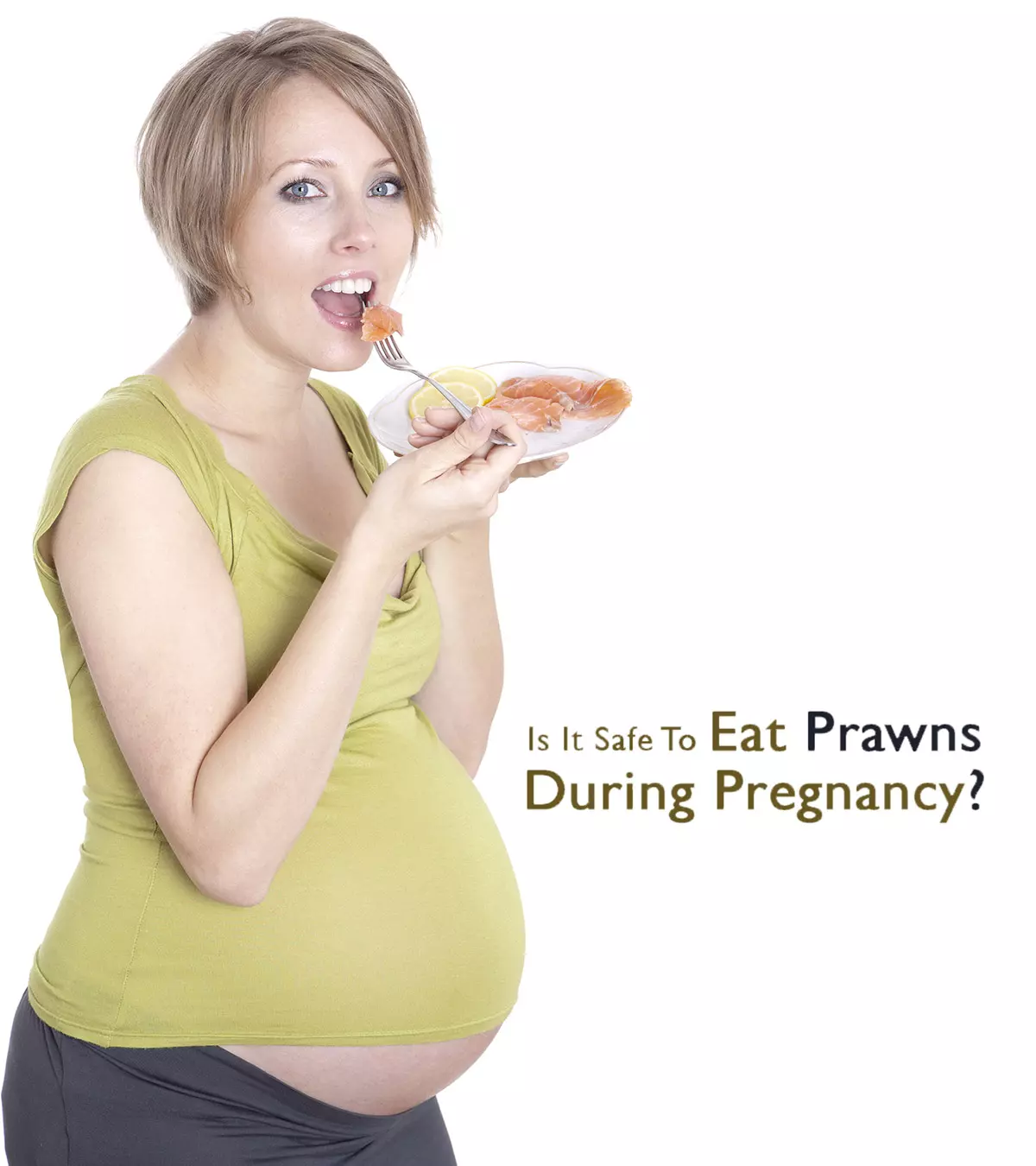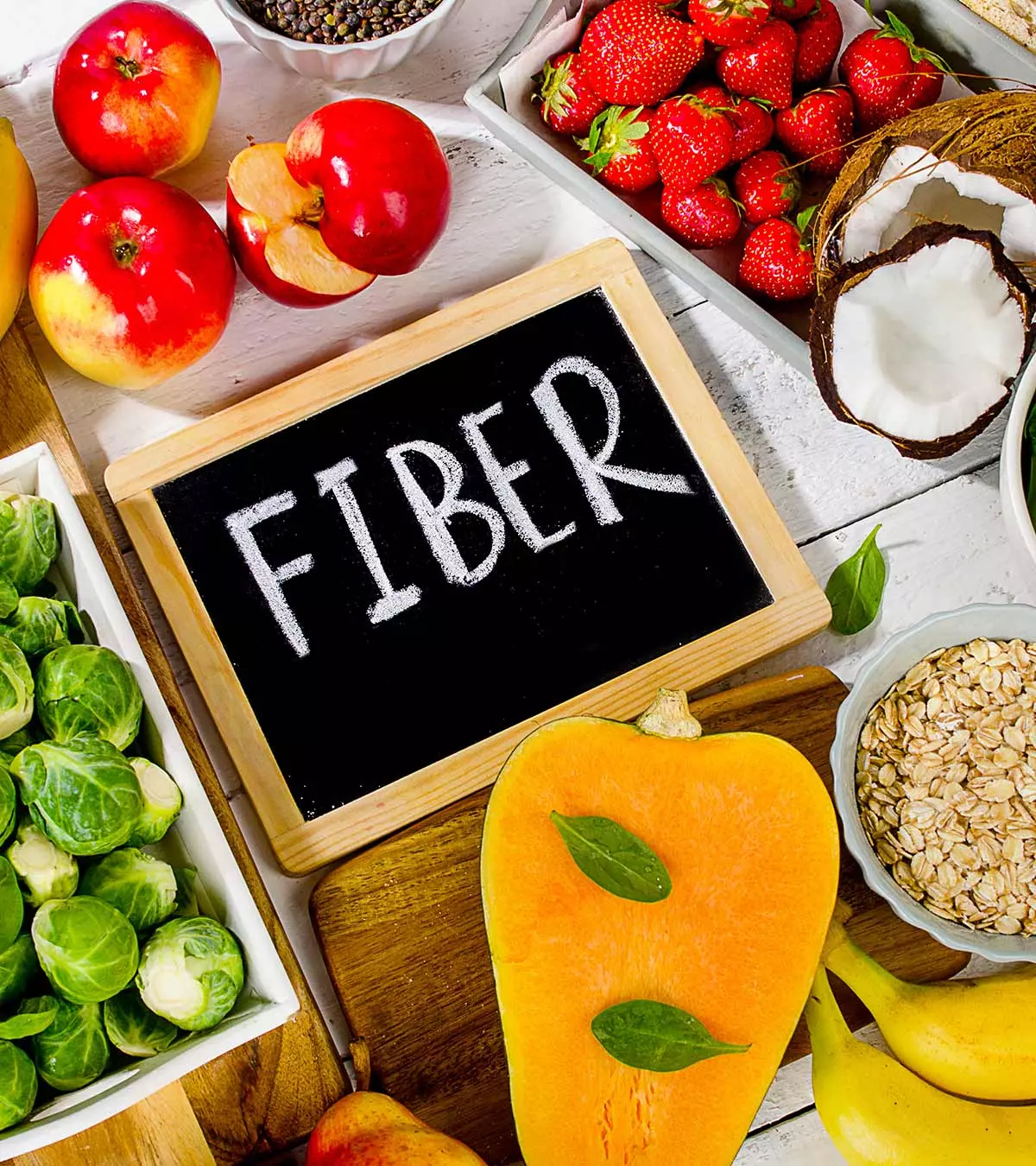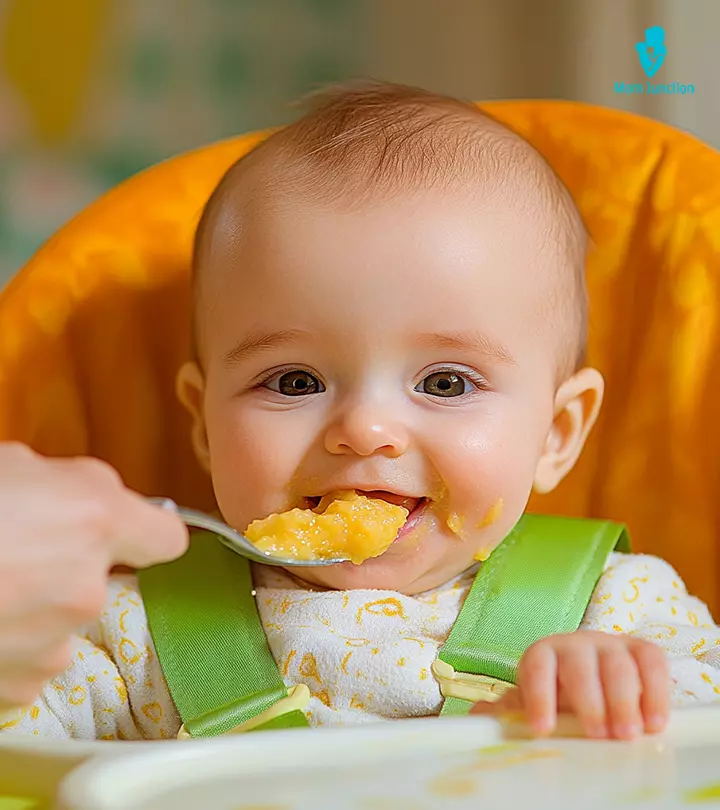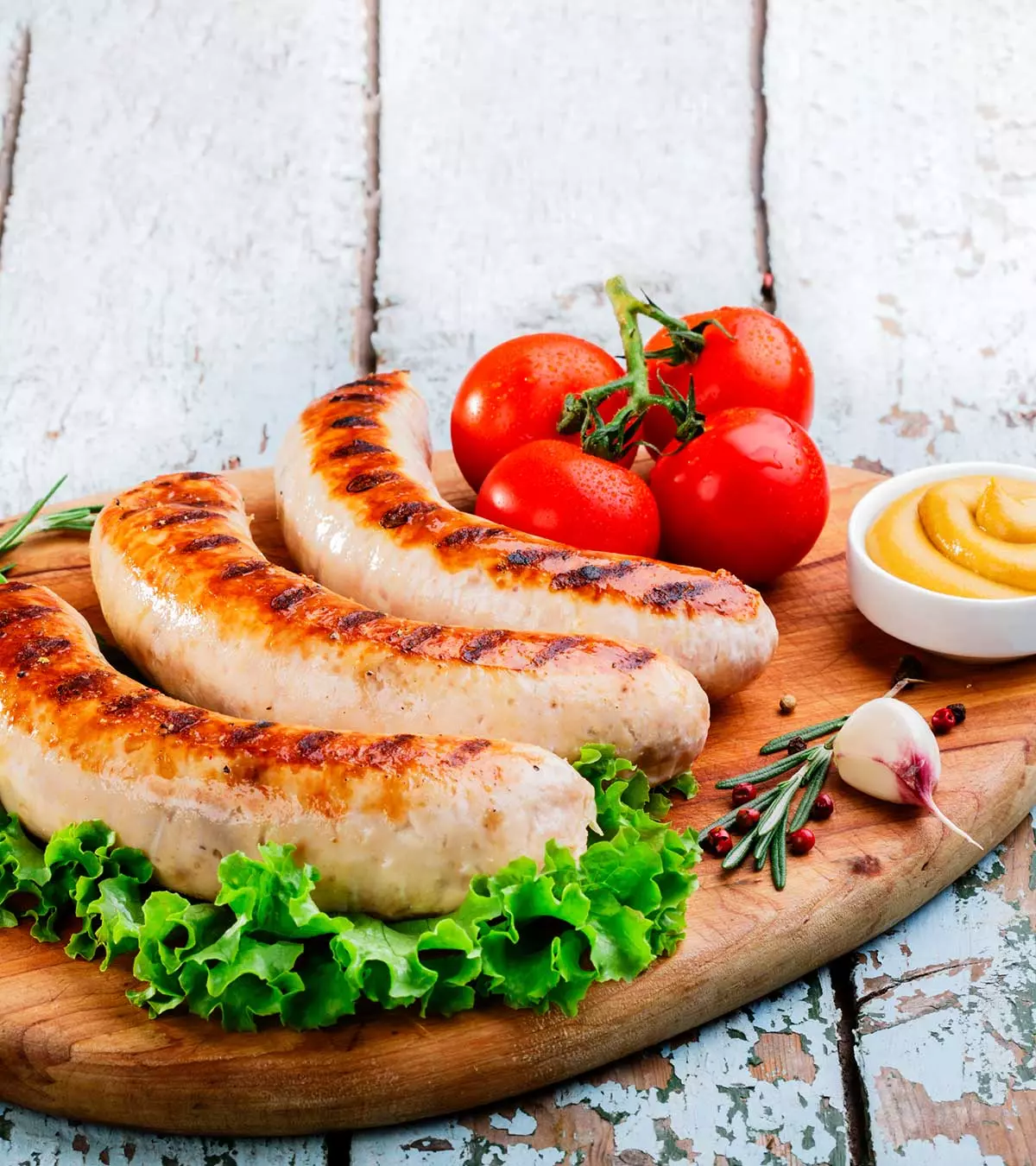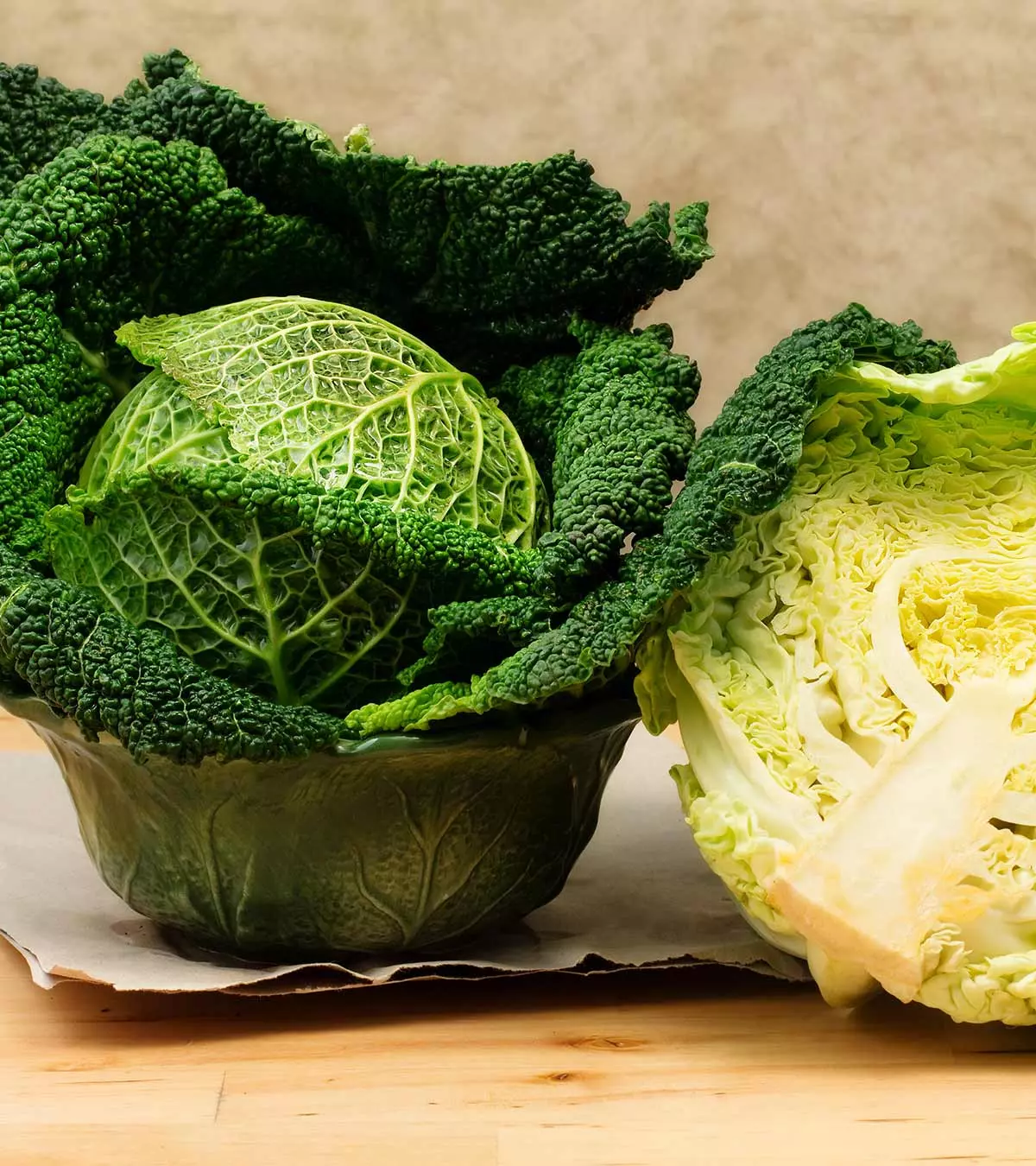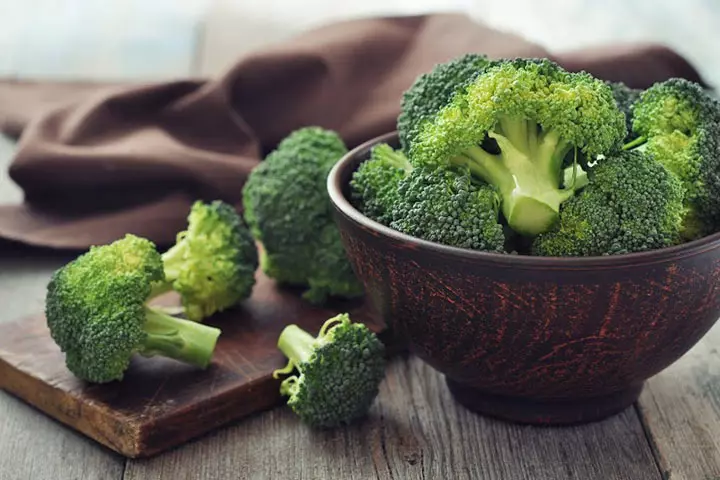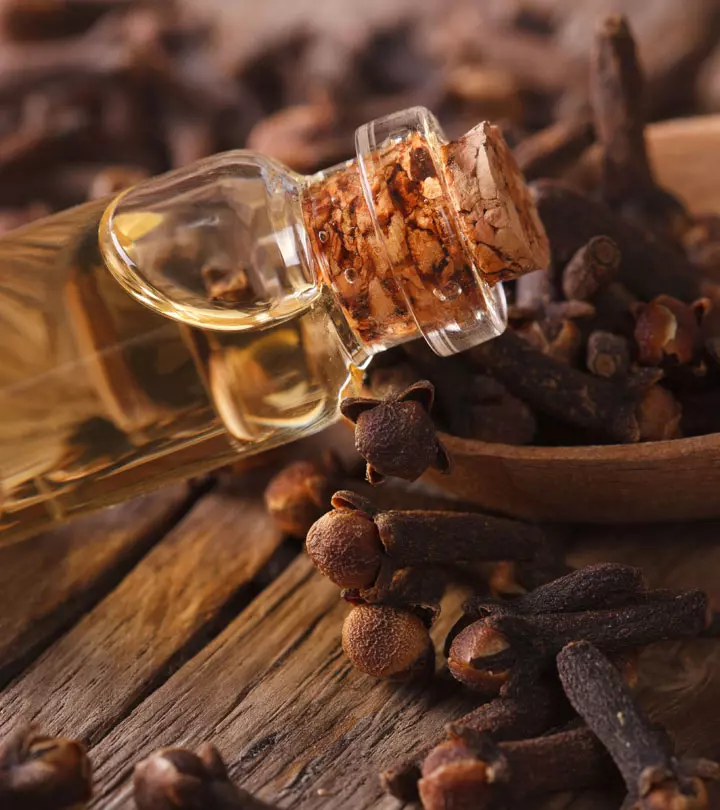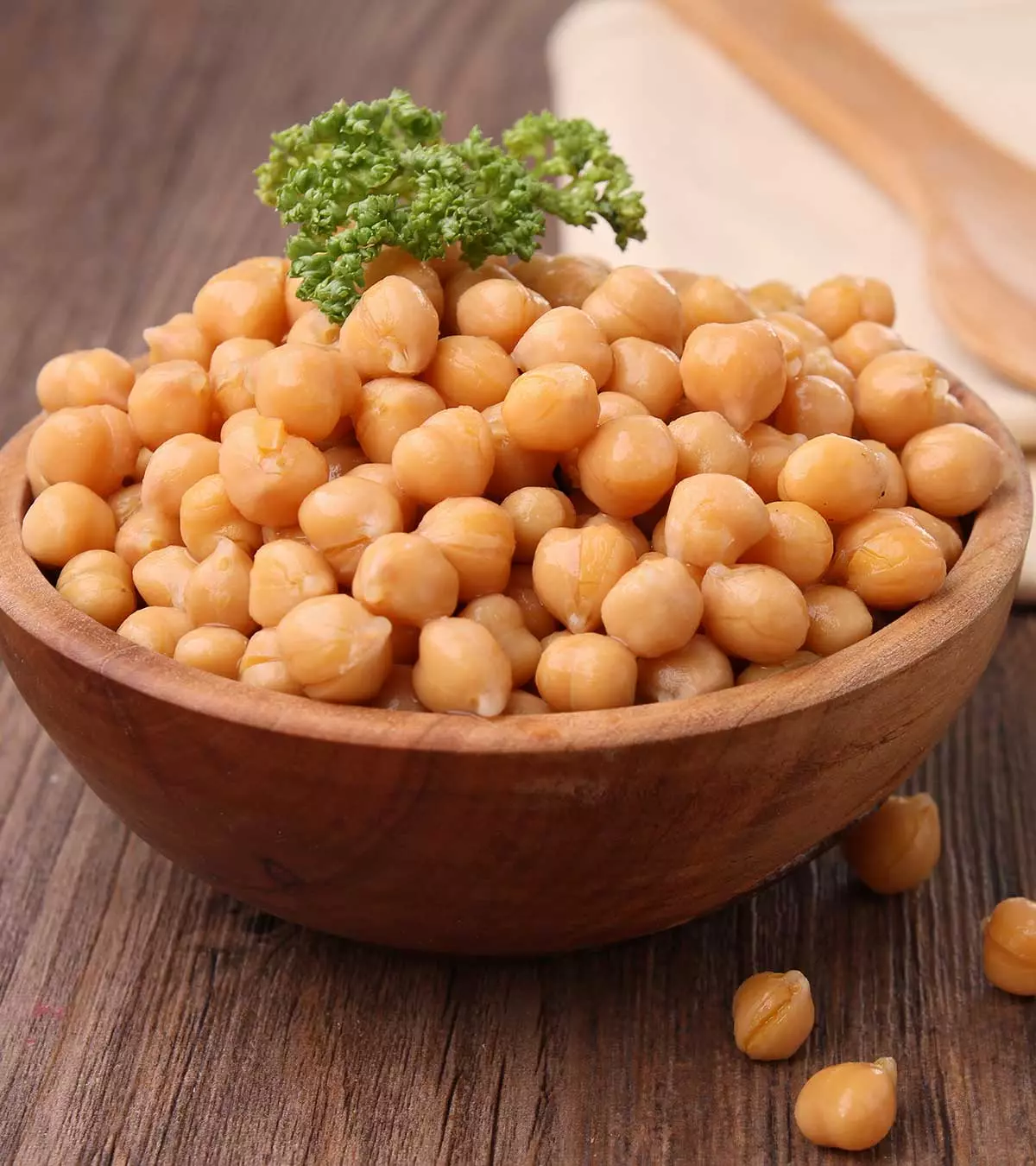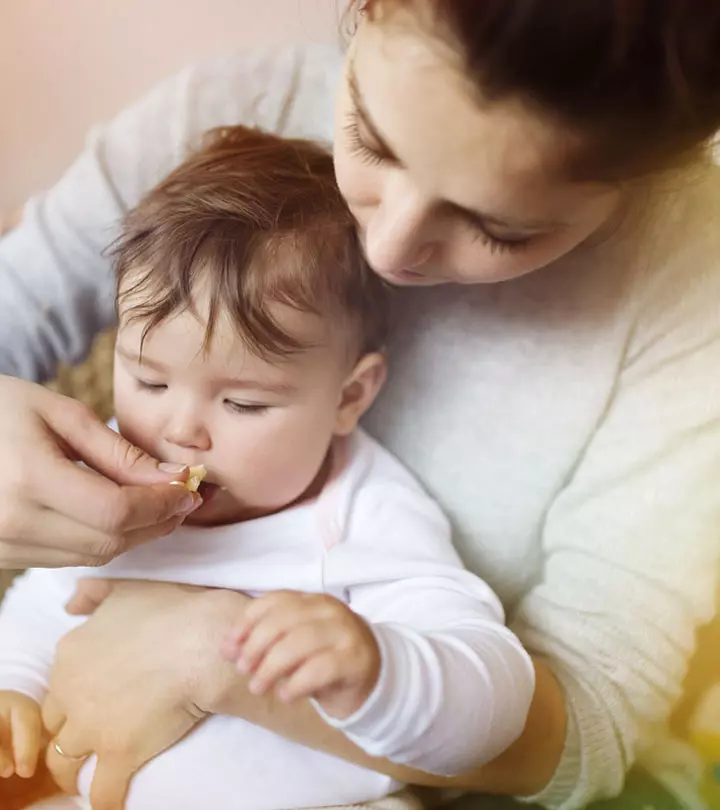
Image: ShutterStock
Can babies eat bacon? Let’s explore. Bacon is a processed meat product made of salt-cured cuts of pork ribs, belly, shoulder, cheeks, and loin. When consumed in limited quantities, it’s a source of several micronutrients and high-quality lean protein. But can babies eat bacon to enjoy these nutritional benefits? What are the right age and age-appropriate ways your little one can eat bacon?
Knowing these details is necessary as feeding bacon to babies is generally not recommended. Read on as we tell you more about the safety of bacon for babies, the right age to feed, its possible health benefits, potential side effects, and healthy alternatives of bacon you can give to your baby.
Key Pointers
- Bacon should not be given to babies below 12 months of age.
- Bacon is a good source of protein and micronutrients in portions.
- Overfeeding bacon to babies may cause weight gain and kidney problems.
- Chicken and fish are better alternatives to bacon for babies.
Is It Safe For Babies To Eat Bacon?

It is good to introduce your baby to a variety of new foods. However, there are certain foods to avoid for babies, such as ham, bacon, sausages etc., which should be introduced at a certain age and in consultation with the pediatrician. Bacon has high amounts of saturated fat, sodium, and food additives, like nitrites (1) (2) (3), making it unsuitable for infants below the age of 12 months. The baby’s kidneys are not fully developed to cope with the high salt food (4). Other additives in bacon may also adversely affect the baby’s body.
When Can Babies Eat Bacon?
There is no standard age to introduce bacon. Most babies begin eating a wide range of solids by the age of 12 months. Some parents introduce foods such as bacon at the age of 14 months, while others prefer waiting for up to 24 months.
Experts recommend limiting processed, greasy meat and high-salt foods, even for toddlers older than 24 months (5) (6). Consult a pediatrician or a pediatric nutritionist before adding bacon to the little one’s diet. A health professional can also guide you on the safe serving size of bacon for your toddler.
Possible Health Benefits Of Bacon For Babies And Toddlers

Feeding bacon, which has an impressive profile of macro and micro nutrients, in limited amounts as a part of a well-balanced diet might provide some benefits to babies and boost their immune system functions. However, you need not feed bacon to the baby exclusively for these benefits. It is important to note that when we talk about the benefits of bacon, we are referring to high-quality uncured bacon made from well-sourced responsibly raised pork.
- Can provide high-quality animal protein: One ounce (28.3 grams) of cooked Canadian bacon can provide eight grams of high-quality protein (7). Canadian bacon is a lean cut of bacon taken from the back of the pork and has relatively good amounts of lean protein and less saturated fat (8). A high-quality protein has all the essential amino acids that are vital for growth (9).
- Rich in important micronutrients: Bacon can provide vital micronutrients , like zinc, selenium, phosphorus, and vitamins A, E , B1, B3, B6, and B12 (10) and minerals like calcium, iron potassium, magnesium, and phosphorous that can play a role in the growth of babies.
Bacon also provides significant amounts of choline that may help maintain several physiological functions, such as neurocognitive development (11) (12).
Possible Side Effects of Bacon For Babies And Toddlers
Regular consumption of a high quantity of bacon may cause side effects.
- May cause unwanted weight gain: Excess consumption of bacon provides a high amount of saturated fats that may contribute to unwanted weight gain in babies. In the long run, a high saturated fat diet may increase the risk of obesity and heart disease (13).
- May harm kidneys: One medium slice (eight grams) of cooked bacon contains 0.135 grams of sodium (14). Toddlers up to three years need 0.8 grams of sodium a day (15), and one slice of bacon alone provides 17% of their daily sodium value. Therefore, over consumption of bacon could lead to excess sodium in the body that may harm the kidneys.
 Things to know
Things to know- May affect overall health: Bacon contains added nitrites that prevent the growth of bacteria and enhance its flavor (16). Cooking the bacon causes a reaction between amines from the meat protein and nitrites leading to the formation of nitrosamines, which are considered carcinogenic (17). Excessive consumption of bacon can expose the baby to a high quantity of nitrosamines, which could be bad for the developing body.
- May cause digestion problems: Babies may find it difficult to digest, causing issues related to the digestive system, such as abdominal discomfort and irregular bowels.

Healthy Alternatives Of Bacon For Babies
Certain foods can be healthier alternatives to bacon for babies and toddlers.
- Vegetarian bacon: It is made from vegetables, like carrot and eggplant, and grains, such as wheat. Tempeh and soy chunks, both derived from soy, are used to make homemade bacon-like strips. Both tempeh and tofu contain much less fat than bacon and are cholesterol-free. Toddlers can usually consume soy products after the age of two years, but consult a pediatrician before adding soy to their diet. You can also substitute with mushroom, which have a meatiness in taste, is very low in fat, is rich in vitamin B, and cholesterol-free.
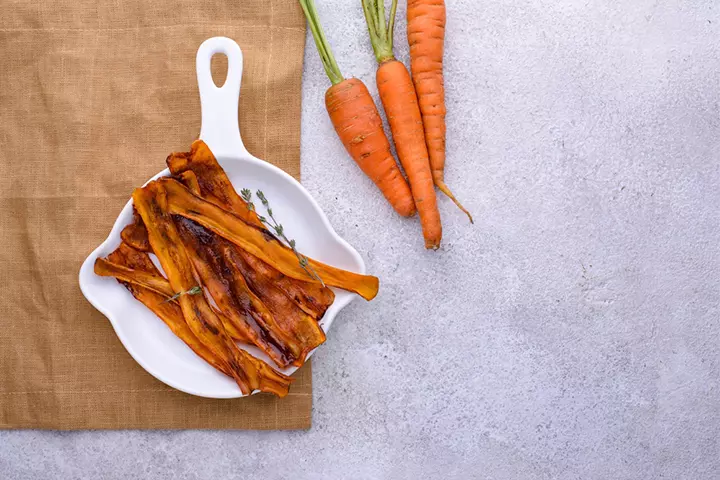
- Chicken: Babies above six months of age can consume chicken in small quantities (18). You can use minced chicken to create homemade chicken fingers that resemble bacon. Prefer fresh and organic lean cuts of chicken, like breast, that is considered a high protein and low-fat food.
- Turkey: Turkey is one of the iron-rich foods with considerable amounts of protein (19).Babies older than six months can eat turkey (20). You can feed your baby pureed turkey or use minced turkey to create homemade bacon. This is most similar to bacon in taste but with less calories and fat than bacon. However, it is vital to wash and cook them well before consumption to avoid food allergies and food poisoning.
- Fish: Fish is rich in high-quality protein and essential nutrients, including omega-3 fatty acids, and low in fat. Toddlers older than two years can safely eat an ounce (about 30 grams) of fish, like salmon and tuna, once to twice a week (21). Homemade fish nuggets can be an excellent replacement for bacon.

 Nutrition fact
Nutrition factFrequently Asked Questions
1. Is bacon a choking hazard for babies?
If the bacon is cooked such that it is crispy or chewy, it may become a choking hazard for babies.
2. How to serve bacon to a one-year-old?
A one-year-old should be served bacon sparingly. It should be cut into long strips and bite-size pieces before serving (22).
3. How much bacon is suitable for a baby?
Although no recommended portion of bacon is specified for babies, according to the University of Michigan C.S. Mott Children’s Hospital, you may give your 12 to 24-month baby three to four servings of pork (half to one ounce) (25). As your baby grows, you may increase the portion size. However, since bacon is processed meat, consult your pediatrician to understand your baby’s portion size.
Bacon is a type of processed meat high in proteins and micronutrients. However, bacon for babies is not recommended as it contains saturated fat, salt, and other additives. You may add small quantities of bacon once your toddler starts eating various foods, including red meat. But do consult your pediatrician. Eating bacon in large quantities from a young age may cause unwanted weight gain, kidney problems, or digestion problems. You may add small quantities of bacon as a part of a balanced diet or opt for healthier alternatives for your little one.
Infographic: Possible Side Effects Of Bacon For Babies And Toddlers
Once you start giving solid food to your little one, you want to make sure that they have a taste of everything. But if you plan to include bacon in their diet, consider taking a look at the infographic below before deciding. We hope the information will help you and you can share it with others. Illustration: Momjunction Design Team
Illustration: When Can Babies Have Bacon? Safety And Alternatives
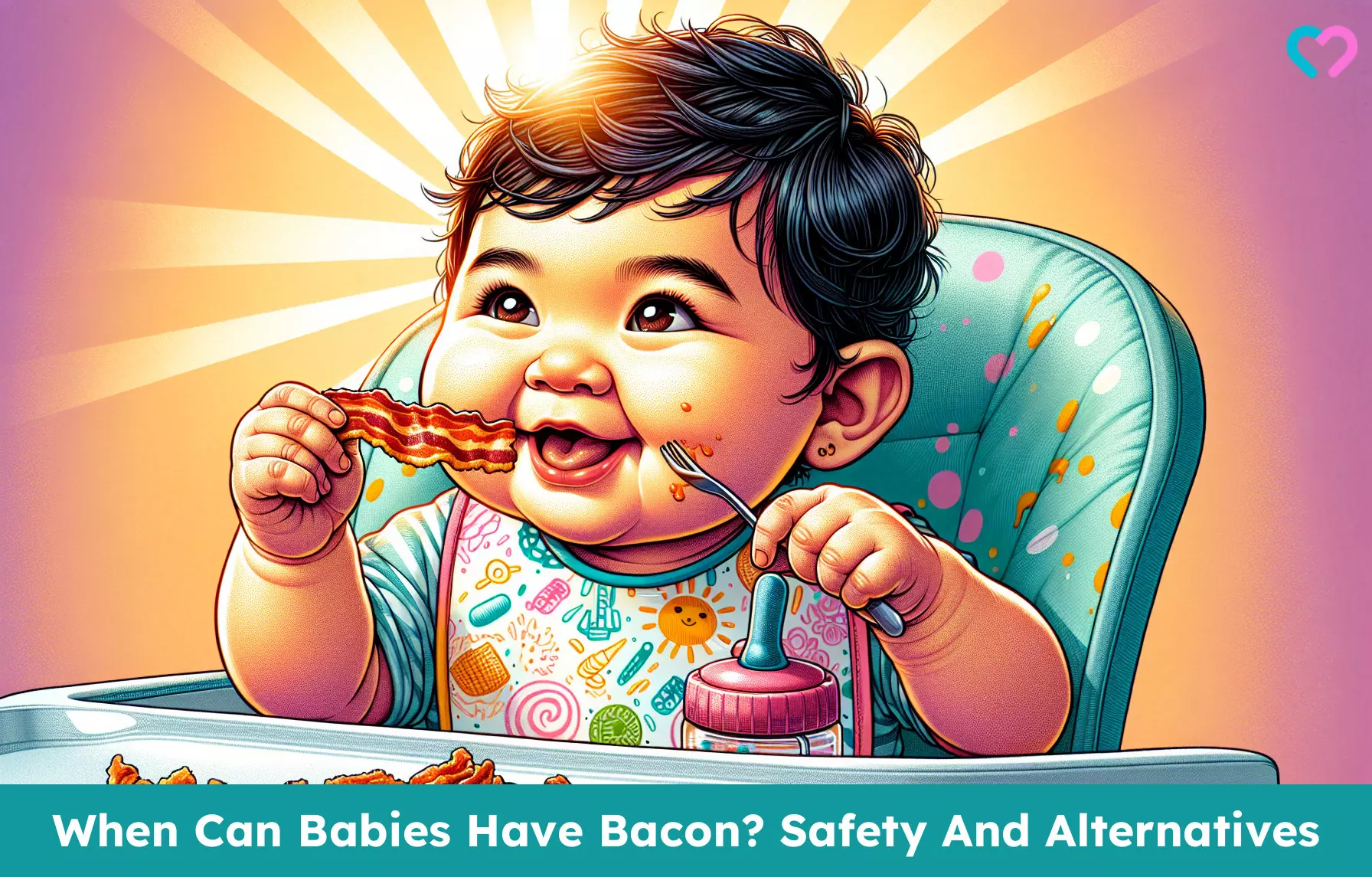
Image: Dall·E/MomJunction Design Team
References
1. Weaning your baby; Government of UK
2. Food Additives and Child Health; American Academy of Pediatrics
3. Meat, Poultry, and Fish: Picking Healthy Proteins; American Heart Association
4. Infrared Organs of Snakes: An Integral Part of Vision; JSTOR
5. Foods and Drinks to Avoid or Limit; CDC
6. Salt and children; Action On Salt
7. Canadian bacon, cooked, pan-fried; USDA
8. Let’s chew the fat… How about bacon?; Michigan State University
9. What Are Complete Proteins?; Cleveland Clinic
10. WacławLaskowski et al.; Meat, Meat Products and Seafood as Sources of Energy and Nutrients in the Average Polish Diet; NCBI
11. Steven H Zeisel et al.; Concentrations of Choline-Containing Compounds and Betaine in Common Foods; NCBI
12. Choline; Oregon State University
13. Effects of saturated fatty acids on serum lipids and lipoproteins: a systematic review and regression analysis; WHO
14. Bacon or side pork, fresh, cooked; USDA
15. How much salt do babies and children need?; NHS UK
16. Preservatives – Exploring nitrate & nitrite safety; Michigan State University
17. Bacon and Food Safety; USDA
18. Working Together: Breastfeeding and Solid Foods; American Academy of Pediatrics
19. Iron Rich Food; Cedar Sinai
20. Nutrition Supervision; American Academy of Pediatrics
21. Healthy Fish Choices for Kids; American Academy of Pediatrics
22. Menu Planning in Childcare Centers; Health Unit, Haldimand-Norfolk
23. Salt in your toddler’s diet; Infant and Toddler Forum
24. Healthy Fish Choices for Kids; AAP
25. Feeding Your Baby, Step by Step; University of Michigan C.S. Mott Children’s Hospital
Community Experiences
Join the conversation and become a part of our nurturing community! Share your stories, experiences, and insights to connect with fellow parents.
Read full bio of Seeemaa Budhraja
Read full bio of Swati Patwal
Read full bio of Rohit Garoo
Read full bio of Ghazia Shah










